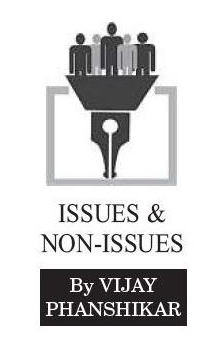A Sly Agenda
| Date :11-Sep-2021 |

New Delhi, September 9 (IANS): A research study has shown that China has lavishly spent huge sums of money to buy influence in India’s film world, universities, social institutions, research think-tanks, social media, and the tech industry, posing a serious threat to national security and democracy.
The 76-page report titled “Mapping Chinese Footprints and Influence Operations in India” released by the Law and Society Alliance on September 3 tries to identify how deep and extensive the Chinese foothold in India is.
The report ... identifies key elements and ways in which Chinese Intelligence services and the Chinese Communist Party government have entrenched themselves into various Indian sectors from the entertainment industry to academia. ...
THE seriousness of the issue can never be understated. Though this report has brought out in cumulative detail of how the Chinese are buying influence in the Indian society through a sly agenda, many alert elements in the country were already aware of how China was slowly but surely undermining our national ethos in multiple ways. They were conscious that the gullible in the country were falling prey to the materialistic temptations offered by the Chinese agents and handlers of this sinister project -- of course in conjunction with a few Indian persons whose loyalty had been bought over by vested interests from China. To the alert people in the Indian media also, this picture was getting clearer every passing day. They felt simply aghast that even some Indians could be bought over by the Chinese agents and would play Beijing’s hands in the dirty game.
The details were shocking, to say the least, on most counts. Some media entities -- that is personalities and institutions -- even allowed publication of sumptuously paid advertisements in the newspapers or magazines or other platforms decrying Indian interests, maligning the story of India.
The most important aspect of the Law and Society Alliance Report is the excessive importance attached to all their endeavours by some media entities. It is common global experience that when commerce plays an overriding role in the society, sense of pride and value system become the early casualties. Just because easy and huge money is poured into a deal, the acceptance comes fairly easily. Then the justification offered is, in effect, -- the offer was too good (read ‘lucrative’) to reject. When the society starts operating on such premises, then what first goes out of the window is caution about national identity, national pride, cultural values, historical legacies ...!
Most unfortunately, the larger Indian society never realised the sly growth of this silent scourge that sought to eat up India’s sense of identity in such easy a manner. Because money assumed such an importance in general Indian thought-process, it was only natural for anti-India forces to start using it as a tool to start buying influence in critical areas such as entertainment media, general media, social media as well as the academia. All these aspects seem to have been appropriately referred to in the Law and Society Alliance report that has the capacity to shake the larger society out of slumber.
Of course, it is not just the Chinese who were waiting for an opening into the changing Indian mindset. Influencers from other countries, too, picked up the opportunity to start buying their way into Indian mind. Many of these foreign vested interests started alluring Indian intellectuals and media persons plus political operatives with ‘offers too good to refuse’. As a result, the sly campaign to obstruct the smooth flow of Indian thought started gaining increasing acceptance by the deaf-and-dumb-and-blind Indian society that was under the awe of commerce as the sole aim of life. The growing Indian lust to “monetise” (a new term in the Indian thought horizon) also started playing havoc with the society.
Of course, in this sly agenda, only the gullible Indians became willing partners in crime against the larger Indian interests -- even though they would not admit that, or may have their tracks covered to fudge the larger attention.
Unfortunately, in the past few years, this scribe, too, has noticed and felt sorry about the growing importance of commerce as the sole destination of all human activity. It is an actual misfortune of the larger Indian society that its members have forgotten the word of caution offered by Mahatma Gandhi in his list of seven sins -- Commerce without ethics. This scribe has felt continually worried that money could buy anything even in a pursuit as proud and straightforward as journalism. This scribe has been feeling terribly sad and sunken that in creasing importance to commerce was pushing philosophy and morality to the sidelines -- as a result of which the media started playing directly into the commercial hands.
The Chinese would have been bloody fools had they -- and many others -- not jumped at this opportunity to plough the unsure Indian mind made unnecessarily soft and fragile by the influence of commerce. They would have been stupid had they not taken the advantage of this growing and expanding Indian social weakness stemming a total moral bereftness and bankruptcy. But the Chinese -- and others -- were smart to start loosening their purse strings for the greedy and morally degraded elements in the Indian society. The rest was easy.
The reflection of the moral weakness and the willingness to fall prey to temptations is visible in countless places in the Indian society -- and more so in the media in all its forms. It is very sad that money has been able to start carving out an entirely new narrative aimed at confusing the Indian people. Unfortunately, the media and the academia have been witting or unwitting partners in this crime so influenced by commerce at the cost of India’s identity and signature, plus the nationalistic pride.